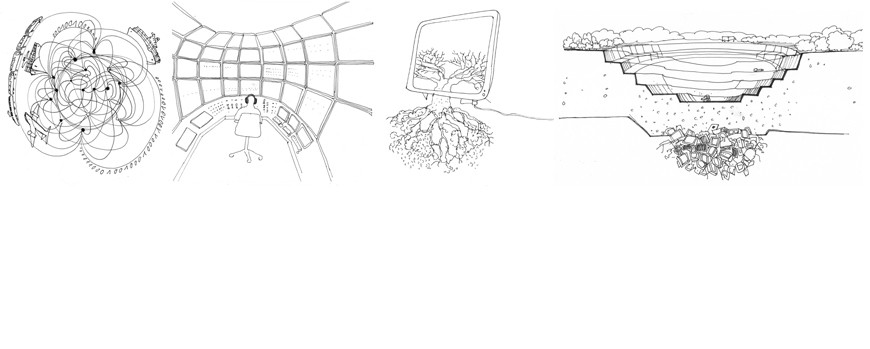Media Ecology – Knowledge Cultures and Media Environments
The professorship Knowledge Cultures and Media Environments (formerly Media Ecology) is located at the Institute for Arts and Media. It is part of the European Media Studies programme, which is conducted in equal cooperation between the University of Potsdam and the Potsdam University of Applied Sciences. Under the heading of media ecology, the professorship focuses on media-based, networked environments that it develops from the past and present of different knowledge cultures. Four focal points are set, the contents of which are critically questioned. They allow media to be seen as environments and, conversely, the mediality of the environments themselves: Forms of networking and mediated connectivity, media aesthetics, media of nature, as well as the geological conditions of the media (raw materials and energy).
Four perspectives
First, the globally networked circulation of images, texts, goods and data is thematized historically and currently. The focus here is on questions concerning aspects of a technosphere, the historical development of infrastructures and various network formations, as well as the question of which phantasms and visions of the future flow into the ideas of a networked world. Secondly, the professorship is dedicated to a comprehensive history and theory of media environments from a media aesthetic point of view, including data, images, texts and sounds. On the one hand, this is about how media shape perception, often in the sense of a media technology "a priori", be it the view of the software Google Earth, which would be inconceivable without satellite technology, be it the findings of the sciences produced by the media or the special aesthetics of environments in computer games and 360° films. Thirdly, the professorship focuses on the media of nature and the "Umwelt", which also has political ecology in mind in the sense of "environmental protection": The technical-media implementation of the view of natural environments or the media-equipped view of "nature" in the form of perceptive environments such as twittering trees, satellite-supported earth sensing or climate simulations and visualisation based on measurements and data, which are to be investigated here. At present, such media methods are often the first basis for the conditions for an understanding of nature. Finally, fourthly, the perspective of a turnaround in the sense of environments as media should be guiding. This makes the connection between the increasing mediatization and networking of environments and a "geology of the media" appear urgent, which questions the finite resources and material cycles of the media (rare earths, recycling, scrap, energy consumption). The planet Earth, as an object mediated by the media, then appears in the focus of these perspectives rather as a compound of disparate, hybrid and corresponding things, such as atmosphere, hydrosphere and technical infrastructures, whose interfaces and interrelations can only partially be made visible today.
The professorship offers MA and BA students of European Media Studies teaching formats that convey the complex connections between media, infrastructures, networks and materials in relation to perception and media aesthetics (teaching). In order to achieve this, in addition to media scientific research, the history of knowledge and technology as well as the history of ecology in its technical and natural manifestations are included. Teaching is offered in the form of project seminars, a lecture on the media aesthetics of environments, as well as in the form of research seminars and excursions.

